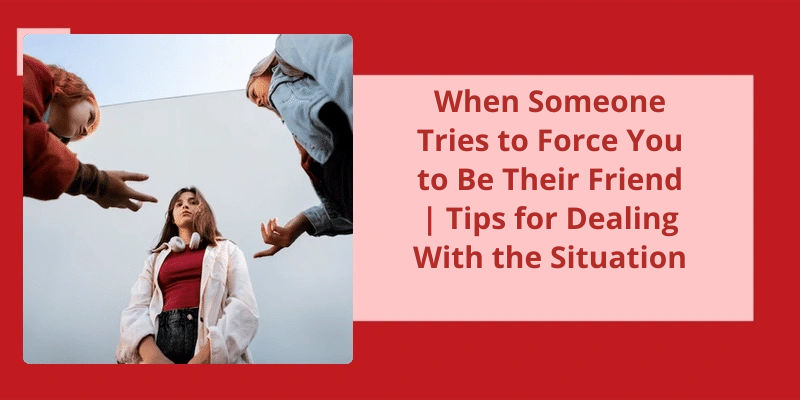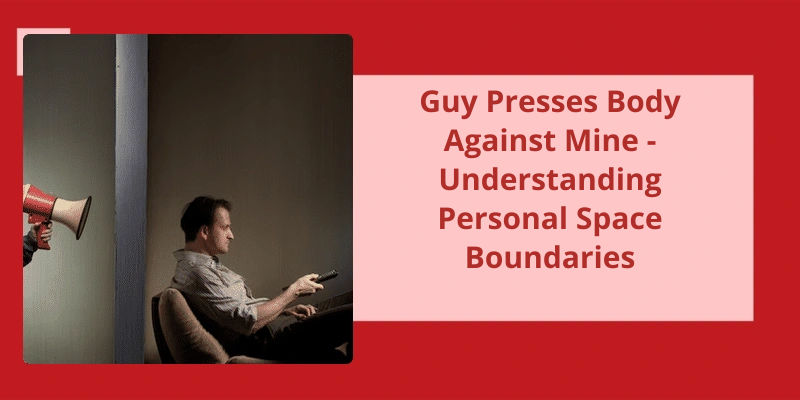Human relationships are complex and diverse. While most people seek to create genuine and meaningful connections with others, there are times when we find ourselves faced with challenging interactions. One common scenario that some people encounter is when they feel pressured or forced into being someone's friend. Whether it's due to social expectations, peer pressure, or even manipulation tactics, being coerced into a friendship can be uncomfortable and frustrating. This can cause feelings of anxiety, resentment, and conflict. Learning how to navigate these situations effectively is an important skill that can help us preserve our autonomy and integrity while also fostering positive relationships.
When Someone Is Trying to Force a Friendship?
When someone is trying to force a friendship, it can be a pretty uncomfortable situation to be in. The feeling of being unwanted or unappreciated can be tough to deal with, especially if you’re someone who values your relationships with others. You may feel like you’ve to walk on eggshells around this person or constantly try to impress them in the hopes that they’ll eventually warm up to you. But the truth is, when someone isn’t interested in being friends with you, there’s little you can do to change their mind.
One of the biggest red flags of a forced friendship is when someone is constantly trying to reach out to you and initiate contact, even though you haven’t reciprocated. This can manifest in many different ways, such as sending you messages on social media or trying to hang out with you in person despite you not showing any interest. While it’s nice that they’re making an effort to get to know you, it can feel like they’re imposing themselves on you and not respecting your boundaries.
Another sign of a forced friendship is when someone is overly complimentary or flattering towards you in an attempt to win your favor. This can come across as insincere or manipulative, which can damage any potential relationship you may have had with them. It’s important to keep in mind that genuine friendships are built on mutual respect and trust, not flattery and empty promises.
It’s important to be honest and upfront with them about your feelings and intentions, without being cruel or dismissive. If you aren’t interested in pursuing a friendship with this person, politely decline their invitations and make it clear that you’ve other priorities in your life that take precedence.
Ultimately, friendships should be based on mutual respect and shared interests. If someone is trying to force a friendship, it’s unlikely that you’ll be able to build a genuine connection with them. It’s important to recognize when it’s time to walk away from a situation that isn’t healthy or beneficial for either party, and to focus your energy on cultivating meaningful relationships with those who’re willing to reciprocate your efforts. Remember, true friendships are worth the wait.
Maintaining emotionally healthy friendships is vital to our well-being, but how can we tell if our friends aren’t reciprocating our efforts and using us for their gain? There are easily recognizable signs to watch out for that help identify possible emotional manipulation. In the following paragraphs, we will look at five signs that someone might be using you emotionally in a friendship.
How to Tell if Someone Is Using You Emotionally in a Friendship?
Friendship is a valuable relationship that should be founded on mutual respect, trust, and emotional support. However, friendships can sometimes be one-sided, and you might not even realize that your friend is using you emotionally until it’s too late. Being used in a friendship can be incredibly hurtful, and it’s essential to recognize the signs early on to prevent any further emotional damage.
One tell-tale sign that your friend is using you emotionally is that you only hear from them when they need something. It could be anything from borrowing money, a ride, or even a place to crash. If your friend only contacts you when they need a favor, they’re not valuing the friendship. They’re merely using you to fulfill their needs without reciprocating the same level of care and attention.
If your friend freely shares your secrets and personal information without your consent, she’s not respecting the boundaries of your friendship. Such behavior can be damaging and can lead to a breakdown in your relationship.
Your friend making plans with your mutual friends and intentionally excluding you is another sign that you’re being used in a friendship. If your friend always seems to hang out with your friends without inviting you, it can mean that she’s trying to keep you out of their plans. Such behavior can be hurtful, and you might feel like you’re not significant or valued in the friendship.
Another sign to look out for is a negative change in your friend’s attitude toward you. If your friend suddenly becomes distant, indifferent, or rude to you, it’s a sign that things might have changed. Your friend might be upset with you, or she might have found someone else to rely on emotionally, leaving you behind.
Lastly, if your friend seems insincere in their interest in you, it’s time to take a step back and reassess your friendship. If your friend doesn’t seem to care about your life or your well-being and only talks about themselves, they’re not genuinely invested in the friendship. A true friendship is built on mutual interest, and if your friend isn’t showing any, it’s time to reconsider.
How to Establish Clear Boundaries in a Friendship to Prevent Emotional Manipulation
- Communicate your boundaries clearly and assertively.
- Be aware of your own emotions and needs.
- Recognize and respect your friend’s boundaries.
- Stay firm in your boundaries and don’t compromise them for your friend’s benefit.
- Avoid participating in activities or behaviors that make you uncomfortable or compromise your values.
- Consider the patterns and dynamics in your friendship and address any issues that may be contributing to emotional manipulation.
- Be willing to end the friendship if your boundaries continue to be disregarded and your emotional well-being is at risk.
Source: 5 signs you’re being used in a friendship | Canadian Living
It’s no secret that maintaining friendships can be difficult for some people. Whether it’s discomfort around others, personality issues, or simply preferring solitude, there are many reasons why someone might struggle with forming and keeping connections with others. For those who find themselves facing these challenges, talking with a therapist could be an effective way to identify and address underlying issues.
Why Do Some People Struggle With Friendships?
For some people, making friends comes naturally. But for others, it can be a real struggle. There are many reasons why someone might find it difficult to form and maintain friendships. One of the most common reasons is personality issues. People who’re too pushy, talkative, or controlling can be off-putting to others, making it harder for them to connect with potential friends. Some people may also struggle with social anxiety, finding it difficult to put themselves out there and make new connections.
Some people may simply not know how to start a conversation or keep one going. They may struggle with small talk, or find it hard to read social cues, making it difficult to connect with others. Additionally, past experiences can impact ones ability to form friendships. For example, if someone has been bullied or rejected in the past, they may be hesitant to open up and trust others.
Sometimes, people struggle with friendships simply because they don’t have enough opportunities to meet new people. This can be especially true for those who work from home or have limited social circles. In these cases, it can be helpful to seek out new activities or groups that align with your interests. Joining a class or club can provide a space to meet like-minded people, making it easier to form connections.
If youre someone who struggles with friendships, it can be helpful to talk to an objective third party, such as a therapist. A therapist can help you explore any underlying issues that might be interfering with your ability to form connections with others. They can also provide tools and strategies for improving your social skills or managing social anxiety. Additionally, therapy can be a safe space to process any past experiences that might be impacting your current relationships.
Ultimately, forming and maintaining friendships takes effort and openness. It requires a willingness to be vulnerable and take risks. It can be challenging, but the rewards are worth it. Having close connections with others can improve our mental health and overall wellbeing, providing us with support and companionship on our life journey. If youre struggling with friendships, know that youre not alone, and that theres help available to support you on your path towards connection.
How to Identify and Address Toxic Friendships
Toxic friendships can be identified by noticing patterns of behavior that are consistently negative or harmful. These include constant criticism, jealousy, manipulation, and a lack of respect for boundaries. To address toxic friendships, it’s important to have an honest conversation with the friend and set boundaries for the relationship. It may also be necessary to limit or end the friendship if the behavior continues.
What Is an Obligatory Friendship?
It often starts with a small favor or gesture of kindness from the obligatory friend that makes it difficult to say no to them in the future. The relationship then becomes one of obligation rather than genuine friendship.
While some people may feel that it’s important to maintain obligatory friendships out of a sense of duty or loyalty, others may see it as a burden that takes away from the time and energy they could be using to nurture more fulfilling relationships. Obligatory friendships can be especially draining for introverts or people who highly value their alone time.
One challenge with obligatory friendships is that it can be difficult to break free from them once they’re established. Even if you recognize that the relationship isn’t bringing you joy or fulfillment, it may feel uncomfortable or even mean to cut ties with someone who’s become used to your company. However, it’s important to remember that friendships should be mutually beneficial and enjoyable for both parties.
Ultimately, the most important factor in any friendship is that both parties are happy and fulfilled. If you find yourself in an obligatory friendship, take some time to reflect on why you continue to engage with that person. Is it out of guilt, obligation, or habit? Or is there genuine joy and connection there that’s worth the effort of maintaining the relationship? By being honest with yourself and setting clear boundaries, you can create a more satisfying and fulfilling social life for yourself.
It’s natural to crave friendship and feelings of belonging, but when these desires turn into a desperate need to force a friendship, it can be a recipe for disaster. While it may seem like a quick fix, in the long run, this approach to making friends rarely works out well for anyone involved. Let’s explore why it’s best to avoid the practice of forcing friendships, and what you can do to build genuine connections instead.
Is It Bad to Force Friendships?
For starters, forcing a friendship can come off as insincere. If the other person catches on that you aren’t genuinely interested in their friendship but instead are trying to meet some goal or agenda, it will likely lead to resentment and ultimately, a failed friendship. Nobody wants to feel used or like a pawn in someone else’s agenda. Furthermore, a forced friendship will lack the basic foundation required for a healthy, functioning friendship – trust and honesty. If you aren’t honest about your intentions, why should the other person believe anything you say or even bother investing any time or energy into getting to know you? Trust is built over time and can’t be rushed or manufactured. Another pitfall of forcing a friendship is that it can cause anxiety or stress. If you find yourself constantly trying to initiate plans or conversations with the other person but are constantly being met with resistance or indifference, you may start to feel discouraged or even desperate. This can lead to unnecessarily high levels of anxiety or stress, which is never a recipe for a healthy relationship. Lastly, forcing a friendship can lead to the other person feeling uncomfortable or trapped. If you’re constantly pushing for a friendship and the other person isn’t reciprocating, they may start to feel cornered or stuck in an uncomfortable situation. This can ultimately lead to them distancing themselves or even avoiding you altogether, which is counterproductive to your goal of a thriving friendship. Overall, it’s best to let friendships develop naturally and to not force them. This means engaging in conversations and activities that interest you both, being open and honest about your intentions and goals for the friendship, and always being respectful of the other person’s boundaries and comfort levels. Friendship should be a two-way street built on trust, honesty, and mutual respect, and forcing it will only lead to disappointment and potentially toxic relationships.
How to Determine Whether You’ve Been Forcing a Friendship, and Steps You Can Take to Repair an Existing Friendship That May Have Been Forced.
- Reflect on your motives for the friendship and whether they’re genuine
- Assess whether you’re putting in more effort than the other person
- Consider if the friendship is draining or energizing
- Be honest with yourself and the other person about your feelings
- Communicate openly and listen actively
- Respect boundaries and give the other person time and space if needed
- Engage in activities that you both enjoy
- Focus on building a genuine connection rather than trying to impress or please the other person
- Be patient and don’t force the friendship to progress at a certain pace
- Appreciate and celebrate the unique qualities and strengths of the other person
It’s no secret that friendships require effort and maintenance to stay strong. However, certain behaviors can quickly erode even the closest bonds. One of the most significant culprits is a lack of appreciation or balance in the relationship. When one friend consistently takes and rarely gives back, resentment and frustration can build, potentially destroying the friendship altogether. Let’s explore this issue further and discuss some other damaging behaviors to avoid.
What Behavior Can Destroy Friendship?
Similarly, if you aren’t balancing your time and efforts in a friendship, it can lead to unspoken feelings of resentment and cause rifts to form in the relationship. One person might feel like they’re always giving without receiving in return, which can be a major cause of friction. Ultimately, a lack of appreciation or balance can chip away at even the strongest of friendships.
Another behavior that can destroy friendships is being overly critical or judgmental. While it’s natural to have disagreements or different opinions, constantly putting your friend down or making them feel insecure can be damaging to the relationship. Your friend might begin to feel like they cant be themselves around you, or start to resent your constant criticism. It’s important to remember that friendships are about supporting and uplifting each other, not tearing each other down.
Similarly, dishonesty can be a major hurdle in any friendship. If you’re constantly lying to your friend or hiding things from them, it can erode their trust in you and create an atmosphere of suspicion and tension. It can also make it difficult for you to be honest with yourself and your friend, which can make it difficult to move forward in the relationship.
Jealousy and envy can also drive a wedge between friends. If you find yourself constantly comparing your life to your friends, or feeling resentful of their success or happiness, it can be difficult to maintain a strong bond. It’s important to recognize that everyone has their own unique path in life, and that your friends success or good fortune doesn’t take away from your own.
Lastly, selfishness can be a major cause of strife in friendships. If you only think about your own needs and wants, and aren’t willing to compromise or put in effort to make the relationship work, it can be difficult for your friend to feel valued and supported. Friendships require give and take, and if you’re only taking, it will eventually wear on your friend and damage the relationship.
Friendships can be resilient, but they require effort and care to maintain. Neglecting to appreciate and balance the relationship, being overly critical or dishonest, allowing jealousy or selfishness to take over, are all behaviors that can destroy a friendship. Being aware of these negative behaviors and actively working to counteract them can help keep your friendships strong and healthy for years to come.
How to Repair a Damaged Friendship.
- 1. Take responsibility for your actions.
- 2. Apologize sincerely for any hurt caused.
- 3. Listen to the other person’s perspective and validate their feelings.
- 4. Communicate openly and honestly about what happened.
- 5. Make a plan to move forward and rebuild trust.
- 6. Show your friend that you care and are committed to repairing the friendship.
- 7. Be patient and allow time for healing and rebuilding.
Conclusion
In conclusion, it’s important to remember that true friendships are built on mutual respect, trust, and a genuine connection. No one should ever feel forced or pressured to be someone's friend, as this can lead to feelings of resentment and discomfort. It’s okay to politely decline an invitation to hang out or spend time with someone if you don’t feel a genuine connection with them. Remember to prioritize your own well-being and happiness, and surround yourself with people who uplift and support you. Forced friendships ultimately lead to more harm than good, and it’s important to recognize and respect your own boundaries in any social situation.






